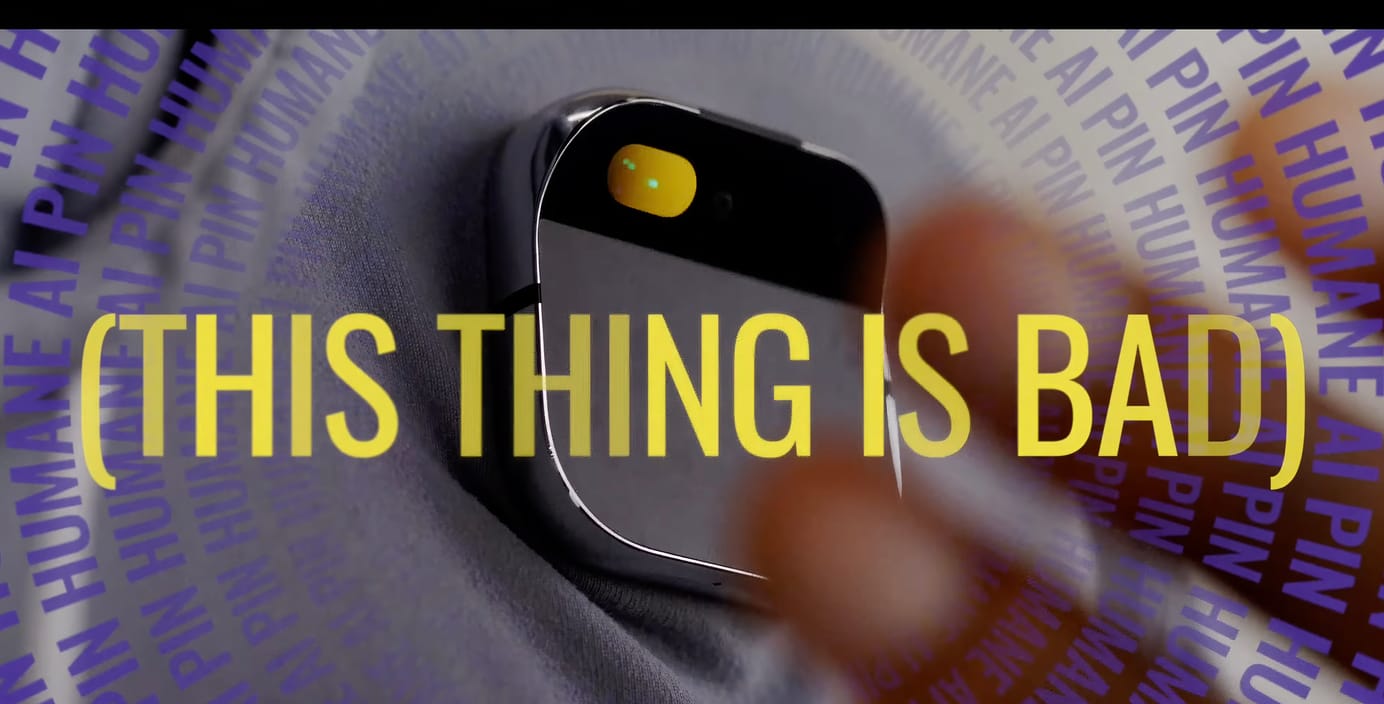
What's the true job of a tech reviewer?
Does a reviewer have a duty to ease off a bad product to protect a company from harm? No!
There's been a minor storm brewing around journalism ethics, that's centred on one of the most popular journalists in the world. But, because he's a YouTuber and a reviewer, the storm hasn't moved much out of the tech world.
Massive YouTube star Marques Brownlee ruthlessly deconstructed the Humane AI Pin, a badge that aims to replace your phone. (Notice that every new hardware product needs an AI component…) You can get the general tenor of his review from the headline:
If you don't fancy watching the whole of that video, you can get the general idea from this excerpt on X:
NEW Video - Humane Pin Review: A Victim of its Future Ambition
— Marques Brownlee (@MKBHD) April 14, 2024
Full video: https://t.co/nLf9LCSqjN
This clip is 99% of my experiences with the pin - doing something you could already do on your phone, but slower, more annoying, or less reliable/accurate. Turns out smartphones… pic.twitter.com/QPxztCuBls
Ouch.
Should reviewers “do no harm”?
It's fair to say that some of the tech industry were less than impressed by his review. This X post in particular kicked off a storm:
I find it distasteful, almost unethical, to say this when you have 18 million subscribers.
— Daniel Vassallo (@dvassallo) April 15, 2024
Hard to explain why, but with great reach comes great responsibility. Potentially killing someone else’s nascent project reeks of carelessness.
First, do no harm. pic.twitter.com/xFft3u2LYG
Blimey. This guy — a minor Twitter influencer with courses on tech entrepreneurship to sell — is genuinely asserting that reviewers shouldn't give a bad review because that might hurt the company. Could I perhaps suggest that it isn't really the bad review that's hurting the company — it's the bad product? The reviewer is merely accelerating the process by spreading the news more quickly. Word would get out soon enough when purchaser started getting them. And some of those people have been saved a lot of money by Brownlee's review.
A journalist's duty is to the readers
As Ian Betteridge, himself a long-term reviewer, put it:
“First, do no harm” is not a principle that can or should ever be applied to reviews. “First, tell the truth about the product”, on the other hand, is absolute the reviewer’s mantra. You owe nothing to the people who made the product. You owe everything to the people who might consider spending their hard-earned money on it.
This should be obvious. So why would Vassallo be so surprised by what Brownlee said? Simple. He, like so many other tech industry hangers-on, has become accustomed to a largely compliant and uncritical tech-centric press.
Edward Ongweso Jr had plenty to say on this, in his evaluation of noted tech journalist Kara Swisher's book Burn Book: A Tech Love Story for The Baffler:
For decades, tech journalism and criticism has primarily consisted of glowing gadget reviews, laudatory profiles, and reprinted press releases, all of it colored by Silicon Valley’s self-aggrandizing vision of itself as a laboratory of a brighter future.
🔥🔥🔥. And there's more:
Few writers have been as instrumental to this process as Swisher. In Burn Book, she tries to atone for her decades of boosterism by adopting a slightly more critical posture, but the analysis, such as it is, has no bite because Swisher still, at her core, fundamentally believes in Silicon Valley.
The role of journalism in tech
Too much of the tech media has been little more than an extension of the PR arms of the tech giants. You can see it in the reaction of the “tribes” of tech media: the ones that are loyal to Apple, the Google followers, the start-up evangelists. Their sceptical, cynical takes are the exception, rather than the rule.
And look how many tech journalists have been assimilated into the startup world as venture capitalists: Mike Arrington, Om Malik, MG Siegler. While the mainstream press ignored the burgeoning tech sector for too long, and then swung wildly between criticism and boosterism when it too it seriously, the specialist press has always had an uneasily cosy relationship with these tech companies.
If that relationship is over, it will came as a big shock to people like Vassallo. They've had a couple of decades to get used to an easy ride. But people like Brownlee are so successful that they don't need to worry about the potential backlash of a negative review. They're not reliant on access to the tech companies for their reporting, because they have an audience and a revenue model that works.
So, finally, proper journalism is coming to the tech world, step by step, product by product. Brownlee summed this up perfectly, in his reply to Vassallo's post:
We disagree on what my job is
— Marques Brownlee (@MKBHD) April 15, 2024
Sign up for e-mail updates
Join the newsletter to receive the latest posts in your inbox.










